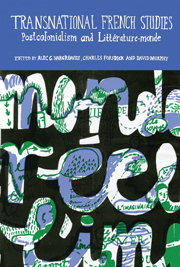Book contents
- Frontmatter
- Contents
- Acknowledgements
- Introduction: What Does Littérature-monde Mean for French, Francophone and Postcolonial Studies?
- From World Literature to Littérature-monde: Genre, History and the Globalization of Literature
- Francophone World Literature (Littérature-monde), Cosmopolitanism and Decadence: ‘Citizen of the World’ without the Citizen?
- From Weltliteratur to World Literature to Littérature-monde: The History of a Controversial Concept
- Littérature-monde in the Marketplace of Ideas: A Theoretical Discussion
- The Postcolonial Manifesto: Partisanship, Criticism and the Performance of Change
- Postcolonialism, Politics and the ‘Becoming-Transnational’ of French Studies
- Mapping Littérature-monde
- Afterword: The ‘World’ in World Literature
- Appendix: Toward a ‘World-Literature’ in French
- Notes on Contributors
From Weltliteratur to World Literature to Littérature-monde: The History of a Controversial Concept
from From World Literature to Littérature-monde: Genre, History and the Globalization of Literature
- Frontmatter
- Contents
- Acknowledgements
- Introduction: What Does Littérature-monde Mean for French, Francophone and Postcolonial Studies?
- From World Literature to Littérature-monde: Genre, History and the Globalization of Literature
- Francophone World Literature (Littérature-monde), Cosmopolitanism and Decadence: ‘Citizen of the World’ without the Citizen?
- From Weltliteratur to World Literature to Littérature-monde: The History of a Controversial Concept
- Littérature-monde in the Marketplace of Ideas: A Theoretical Discussion
- The Postcolonial Manifesto: Partisanship, Criticism and the Performance of Change
- Postcolonialism, Politics and the ‘Becoming-Transnational’ of French Studies
- Mapping Littérature-monde
- Afterword: The ‘World’ in World Literature
- Appendix: Toward a ‘World-Literature’ in French
- Notes on Contributors
Summary
The term littérature-monde, proposed by the forty-four signatories of the manifesto which appeared on 16 March 2007 in the journal Le Monde to describe a concept further developed in their book published by Gallimard in May of the same year, is not exactly a neologism. Although the term Francophonie, against which it sets itself, has a considerable number of problematic connotations, littérature-monde is itself just as loaded. Indeed, we should be aware of its associations and should explore the issues raised by them. Although it appears to be a completely new expression in French, the forty-four's concept of littérature-monde is actually drawn from three preexisting concepts or phenomena. The first is the concept of travel literature and world writing developed since 1992 by Michel Le Bris, himself a signatory of the manifesto. For him, littérature-monde signifies a literature open to the world or, in other words, a literature which speaks of the real and the lived rather than turning in on itself in a state of narcissistic self-consciousness (2007: 25). The second is the concept of the Tout-monde, defined by the Martinican thinker and writer Édouard Glissant as being ‘le monde actuel tel qu'il est dans sa diversité et dans son chaos’ [today's world as it is in its diversity and chaos] (Chanda, 2000). The Tout-monde is not a systematic or rationalizing vision of the world, but instead underlines the global spread of the concept and practice of creolization, a practice of cultural exchange which rejects unequal power relationships.
- Type
- Chapter
- Information
- Transnational French StudiesPostcolonialism and Littérature-monde, pp. 36 - 48Publisher: Liverpool University PressPrint publication year: 2010

